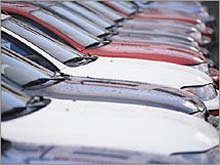New fuel economy regulations could doom U.S. automakers, says Fortune's Alex Taylor.
NEW YORK (Fortune) -- If turned-off consumers, teed-off union workers and fired-up competitors don't kill off what's left of the U.S. auto industry, then proposed new fuel economy standards may finish the job.
Chrysler officially puts the cost of meeting the proposed rules at $6,700 per vehicle. Unofficially, the moneymen from Cerberus behind the private equity buyout for Chrysler are said to be threatening to walk away from the deal if the new requirements go through. That would probably doom the company.

Consumers won't get off scot-free either. Small cars will have to become more costly to pay for new technology, and large cars - and trucks - will have to be priced higher so that consumers will be encouraged to buy the small ones.
All in all, domestic automakers figure that it will cost them $83 billion to meet the new regulations, which call for a hike in the corporate average fuel economy to 35 miles per gallon by 2020. That would be a lot of money for prosperous Google or Berkshire Hathaway, much less an industry that is already losing billions of dollars.
The new bill hasn't become law yet. A vote in the House won't come until fall. And the lobbying between now and then should be furious, assuming summer vacations don't intrude.
But popular opinion isn't running in Detroit's favor. On the heels of higher gas prices, energy security concerns, global warming and Hurricane Katrina, there has been a sea change in public opinion about oil consumption and greenhouse gasses. Consumers are voting with their feet by running out to purchase small cars.
You can blame some of this on the domestic auto industry. Its credibility in Washington has been rock-bottom ever since General Motors was caught tailing Ralph Nader in the 1960s. It doesn't help that, like the NRA, Detroit has been reflexively opposing every attempt to tighten up safety, fuel economy and emission standards for years. It has cried wolf once too often.
Indeed, the Detroit Three have been getting a free pass on fuel economy for more than two decades. Instead of devoting its considerable technical resources to improving gas mileage, it has been cranking up the horsepower of its engines and selling modified trucks as SUVs.
As a result, Bank of America figures Toyota has a five-year lead in the development of hybrid gas-electric vehicles, a technology that Detroit soft-pedaled until recently. Although GM is promising a breakthrough in fuel cells by 2010 and developments in plug-in hybrids even sooner, production of fully-functional gasoline-free vehicles still seems years off.
Still, there is no point in kicking them while they're down. GM (Charts, Fortune 500), Ford (Charts, Fortune 500) and Chrysler are on the brink of collapse. All three companies start the miles-per-gallon race far behind Japan's Big Three.
According to data compiled by Lehman Brothers, GM - the domestic leader in car mileage with 29.3 average miles per gallon - can't touch Toyota, which notches an average of 34.7 miles per gallon. And Chrysler - the American leader in truck corporate average fuel economy (CAFE) standards with 21.9 mpg - is light years behind Honda's 24.5 mpg.
The Detroit Three can hardly afford to cut prices to stimulate sales of high mileage vehicles because they are already at a huge cost disadvantage. Lehman's Brian A. Johnson figures that a Nissan Altima costs slightly more to operate than a Chevy Malibu, but the owner makes it up at trade-in time. The Malibu holds only 38 percent of its original purchase price after four years of use vs. 52 percent for the Altima - a difference of more than $4,000.
That kind of value spread explains why Detroit has to dump so many of its cars in rental car fleets while Japanese vehicles sell mostly at retail. According to data published in Automotive News, more than a third of Ford's and Chrysler's are going into fleets this year, vs. 15 percent for Nissan (Charts) and even less for Toyota (Charts) and Honda (Charts).
As argued here before, the simple solution to using less gas is to start gradually raising the gas tax. That way, people who really wanted large-displacement, low-mileage cars could pay for them directly - at the pump. For low-income consumers and high-mileage commuters, a rebate could be created. Detroit would still be forced to come up with better ideas for fuel economy but at least it wouldn't have to do so with a gun pointed at its head. ![]()
No comments:
Post a Comment